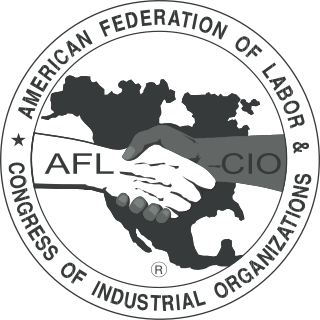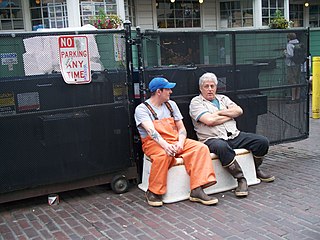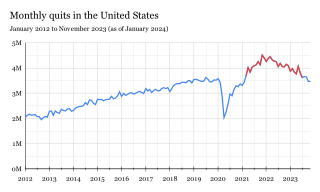
The United States Department of Labor (DOL) is one of the executive departments of the U.S. federal government. It is responsible for the administration of federal laws governing occupational safety and health, wage and hour standards, unemployment benefits, reemployment services, and occasionally, economic statistics. It is headed by the secretary of labor, who reports directly to the president of the United States and is a member of the president's Cabinet.

The American Federation of Labor and Congress of Industrial Organizations (AFL-CIO) is a national trade union center that is the largest federation of unions in the United States. It is made up of 60 national and international unions, together representing more than 12 million active and retired workers. The AFL-CIO engages in substantial political spending and activism, typically in support of progressive and pro-labor policies.

The National Labor Relations Board (NLRB) is an independent agency of the federal government of the United States that enforces U.S. labor law in relation to collective bargaining and unfair labor practices. Under the National Labor Relations Act of 1935, the NLRB has the authority to supervise elections for labor union representation and to investigate and remedy unfair labor practices. Unfair labor practices may involve union-related situations or instances of protected concerted activity.

In conventional usage, boredom, ennui, or tedium is an emotion characterized by uninterest in one's surrounding, often caused by a lack of distractions or occupations. Although, "There is no universally accepted definition of boredom. But whatever it is, researchers argue, it is not simply another name for depression or apathy. It seems to be a specific mental state that people find unpleasant—a lack of stimulation that leaves them craving relief, with a host of behavioral, medical and social consequences." According to BBC News, boredom "...can be a dangerous and disruptive state of mind that damages your health"; yet research "...suggest[s] that without boredom we couldn't achieve our creative feats."
Outsourcing is a business practice in which companies use external providers to carry out business processes, that would otherwise be handled internally. Outsourcing sometimes involves transferring employees and assets from one firm to another.

Trader Joe's is an American grocery store chain headquartered in Monrovia, California, with 571 locations across the US.

The American multinational retail chain Walmart has received criticism from parties such as labor unions and small town advocates for its policies and business practices.
A full-time job is employment in which workers work a minimum number of hours defined as such by their employer.

Dentsu Inc. is a Japanese international advertising and public relations joint stock company headquartered in Tokyo. Dentsu is the largest advertising agency in Japan and the fifth largest advertising agency network in the world in terms of worldwide revenues.

Marissa Ann Mayer is an American business executive and investor who served as president and chief executive officer of Yahoo! from 2012 to 2017. She was a long-time executive, usability leader and key spokesperson for Google. Mayer later co-founded Sunshine, a startup technology company.

Thomas Edward Perez is an American politician and attorney currently serving as senior advisor to the president of the United States and director of the White House Office of Intergovernmental Affairs, holding both positions since June 2023. Perez previously served as the United States Secretary of Labor (2013–2017), the chair of the Democratic National Committee (2017–2021), and United States Assistant Attorney General for Civil Rights (2009–2013).

A break at work is a period of time during a shift in which an employee is allowed to take time off from their job. It is a type of downtime. There are different types of breaks, and depending on the length and the employer's policies, the break may or may not be paid.
A reassignment center is a type of holding facility administered by the New York City Department of Education for teachers accused of misconduct while awaiting resolution of their misconduct cases. As of 2007, the city had thirteen reassignment centers. The teachers are not required to do anything, and they may be assigned to the center for months or years.

The General Union is a labor union founded in 1991 and headquartered in Osaka, Japan. Membership is open to all nationalities and all workers. It has members working in trading companies, factories and restaurants but the majority of members are teachers and staff who are employed in language education at private conversation schools, high schools and universities in the Kansai and Chubu regions of Japan. Union members work at universities such as Ritsumeikan University, and language schools such as ECC, Berlitz and Gaba. Recent years have also seen the union launching major organizing drives among South American workers in Japan, along with Filipino workers.
Pegatron Corporation is a Taiwanese electronics manufacturing company that mainly develops computing, communications and consumer electronics for branded vendors. It also develops, designs and manufactures computer peripherals and components. Pegatron's primary products include notebooks, netbook computers, desktop computers, game consoles, handheld devices, motherboards, video cards and LCD TVs, as well as broadband communication products such as smartphones, set-top boxes and cable modems.

Penal labor in the United States is the practice of using incarcerated individuals to perform various types of work, either for government-run or private industries. Inmates typically engage in tasks such as manufacturing goods, providing services, or working in maintenance roles within prisons. Prison labor is legal under the 13th Amendment to the U.S. Constitution, which prohibits slavery and involuntary servitude, except as punishment for a crime.

Some warehouse workers of Amazon, the largest American e-commerce retailer with 750,000 employees, have organized for workplace improvements in light of the company's scrutinized labor practices and stance against unions. Worker actions have included work stoppages and have won concessions including increased pay, safety precautions, and time off. There are unionized Amazon workers in both the United States and Europe.

The Great Resignation, also known as the Big Quit and the Great Reshuffle, was a mainly American economic trend in which employees voluntarily resigned from their jobs en masse, beginning in early 2021 during the COVID-19 pandemic. Among the most cited reasons for resigning included wage stagnation amid rising cost of living, limited opportunities for career advancement, hostile work environments, lack of benefits, inflexible remote-work policies, and long-lasting job dissatisfaction. Most likely to quit were workers in hospitality, healthcare, and education. In addition, many of the resigning workers were retiring Baby Boomers, who are one of the largest demographic cohorts in the United States.

California Department of Fair Employment and Housing v. Activision Blizzard is a current lawsuit filed by the California Department of Fair Employment and Housing (DFEH), now the Civil Rights Department (CRD) against video game developer Activision Blizzard in July 2021. The lawsuit asserts that management of Activision Blizzard allowed and at times encouraged sexual misconduct towards female employees, that the company maintained a "frat boy" culture, and that the company's hiring and employment practices were discriminatory against women.
Starting in 2022, workers from several Trader Joe's grocery stores have voted on whether to unionize. A store in Hadley, Massachusetts, became the first to unionize and created Trader Joe's United, an independent union unaffiliated with national unions. Stores in Minneapolis, Louisville, and Oakland joined them. Other workers have organized with the United Food and Commercial Workers. Trader Joe's, a chain with over 500 locations and over 50,000 employees, is known for its neighborhood store vibe and over-the-top customer service, which has sometimes clashed with its working conditions. Corporate management has a history of resisting staff unionization efforts. Driven by COVID-19 pandemic working conditions, American service sector organization increased, and Trader Joe's worker concerns over safety, pay, and benefits contributed to their union drive.














